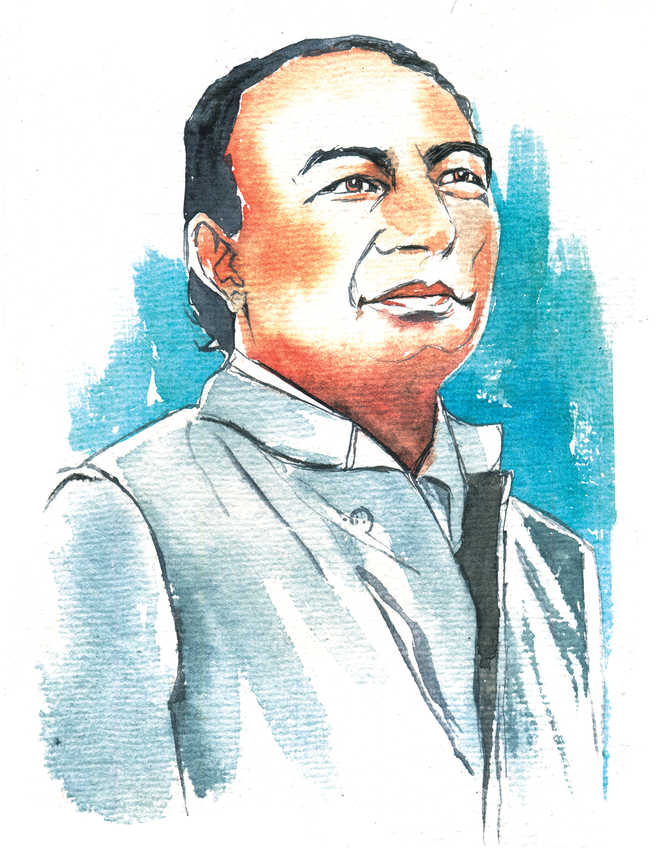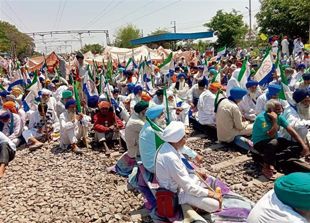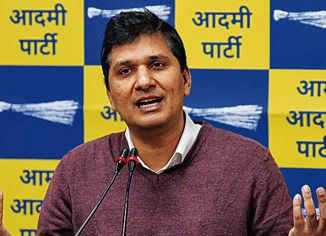
Illustration: Sandeep Joshi
Amarjeet Baath
The grapevine of the Hindi film industry has been abuzz and the news has been doing the rounds since long — a biopic on Sahir Ludhianvi is in the making. Sanjay Leela Bhansali, the maker of spectacles like Devdas, Bajirao Mastani and Padmavat has been working to bring Sahir’s story to celluloid. The actor who is likely to slip into the shoes of the poet lyricist is Abhishek Bachchan. As to who will play Amrita Pritam, his love interest — from Priyanka Chopra to Deepika Padukone and more recently Alia Bhatt — many names have been doing the rounds.
The big question, however, on everyone’s mind is — will the biopic do justice to Sahir’s personality, will his poetry mesmerise again, will the film industry pay a perfect ode to one of its own. These are the nebulous queries at this point.
On his death anniversary (October 25), let us remember the revolutionary poet who lived ahead of his time.
Born Abdul Hayee, he adopted the name Sahir and lived true to his name. For he was a magician of words, who conjured up verses of hopes and inspired dreams of eradicating social evils. Dipped in realism, written with honesty, committed to the cause of common man, Sahir’s writings touched the nerve of his readers.
Raised by his mother, Sahir was well aware of the struggle and exploitation that society handed out to women. His empathy was captured in his “Aurat ne janam diya mardo ko, mardo ne ne use bazaar diya”.
His deep-rooted sympathy for the working class stemmed from his leftist leanings. He read Marx extensively and was a member of All India Students Federation (AISF), affiliated to the Communist Party of India (CPI).
His compassion for the toiling masses, reflected in his verses, made them connect to his words. His collection of poems ‘Talkiyan’ followed by a long poem ‘Parchaiyan’ become popular with progressive writers.
His mother had left his father due to his feudal and philandering ways and had raised Sahir on her own. So he had experienced the harsh realities of life and social imbalances firsthand. That’s how his writings became the voice of people of India. Born and raised in Ludhiana, he studied at Malwa Khalsa School and later Government College for Boys from where he was thrown out. Ironically, after he became a celebrity lyricist, the same college which had expelled him, claimed its famous son and named an auditorium after him.
Parental differences made him and his mother leave Ludhiana and settle in Lahore. But he came back in 1949 after Partition and settled in Bombay.
In an industry, already having many established and renowned poets, Sahir tasted success soon as he ushered in an era of progressive and revolutionary lyrics. He was already an acclaimed writer when he came to Mumbai. His poetry, which had been confined to mushairas and writers’ circle, now found a wider audience as his songs became popular.
His progressive views and lyrics found a resonance not only among audience but his contemporaries too. Many of them like Kaifi Azmi and Shailendra Singh were part of the Progressive Writers’ Association (PWA). Sahir himself had been a part of this movement and it was this association that provided Sahir his cultural platform to express himself as a socialist poet.
A language of social revolution flowed freely from his pen. He wrote verses on fallout of political ideologies, conflicts of religion, atrocities on the common man, women’s rights, etc. His songs challenged patriarchy, morality, social norms and etiquettes, class boundaries, differences of caste and creed, greed, materialism and falling human values.
His anguish and refusal to compromise finds an echo in Pyaasa’s iconic song ...
Ye mahalon, ye takhton, ye taajon ki duniya
Ye insaa ke dushman samaajon ki duniya
Ye daulat ke bhukhe rivaazon ki duniya
Ye duniya agar mil bhi jaaye to kya hai
Despite being an atheist, he could write about God with ease and simplicity . His “Allah tero naam, Ishwar tero naam”, ‘Toraa man darpan kehlaye”, “Tu Hindu banega na Musalman banega, insaan ki aulad hai insaan banega” amply demonstrated his belief in the equality of mankind and universal brotherhood.
Not only for downtrodden, Sahir is also credited with bringing dignity to his own fraternity in the film industry. He was responsible for the acceptance of a long pending demand of getting the name of the lyricist included in the credits of the films.
Such was his aura in his heydays that whenever Sahir penned songs for a film, even his photo appeared on the film poster, along with that of lead actors. A Padma Shri awardee and a two-time Filmfare award winner, Sahir was not just a poet of his times. His vast poetic canvas has stood the test of time.



























